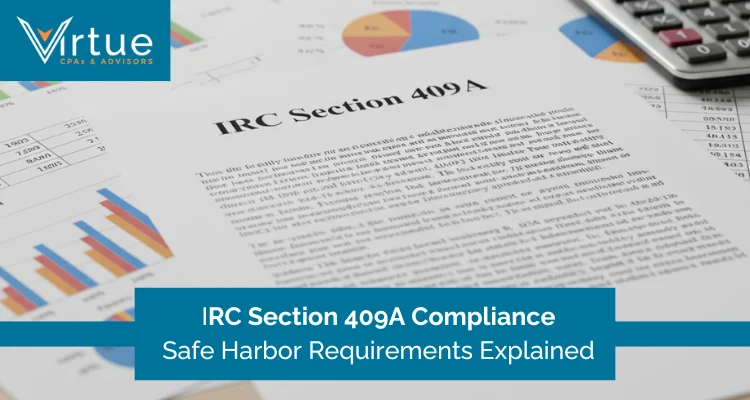The journey of a startup founder is a rollercoaster of innovation, sleepless nights, and monumental achievements. You've secured your first major funding with a SAFE (Simple Agreement for Future Equity) round, a testament to your vision and hustle. But as the ink dries on that document, a new, critical task emerges: the 409A valuation.
For many founders, the term "409A" is shrouded in a mist of legal and tax jargon. You know it's important, but what exactly does it entail, and how does it relate to your SAFE? The answer is simple yet crucial: getting this right is the difference between a compliant, employee-friendly company and a business exposed to significant tax penalties and investor red flags.
At Virtue CPAs, we've guided countless founders through this exact process. We understand that a 409A valuation isn't just a regulatory checkbox; it's a strategic tool that safeguards your company and its most valuable asset: your team. This guide will demystify the entire process, empowering you to navigate your 409A valuation with confidence and foresight.
What is a 409A Valuation and Why Does It Matter for SAFEs?
A 409A valuation is an independent, third-party appraisal of the Fair Market Value (FMV) of a private company's common stock. This value is used to set the strike price for employee stock options, and the price at which your team members can purchase shares in the future.
The name "409A" comes from Section 409A of the U.S. Internal Revenue Code, which was enacted to regulate non-qualified deferred compensation, including stock options. The law mandates that the strike price of any stock option must be equal to or greater than the FMV of the common stock at the time of the grant.
So, why is this so critical after a SAFE round? A SAFE, by design, defers the company's valuation. Investors provide capital in exchange for the right to receive equity in a future priced round. This means that while you have cash in the bank, you don't have a formal, per-share valuation for your common stock the type of stock you'll grant to your employees.
Without a 409A valuation, any stock options you grant could be priced arbitrarily. If the IRS later determines the strike price was set below the true FMV, your employees could face severe tax penalties, including:
- Immediate taxation on all deferred compensation.
- An additional 20% penalty tax.
- Accrued interest on the underpaid taxes.
These penalties don't just affect your team; they can severely damage employee morale, create a legal and financial liability for your company, and make you look unprofessional to future investors. A properly conducted 409A valuation provides a "safe harbor," giving you a legal defense against IRS challenges.
The biggest mistake founders make is waiting until the last minute. The need for a 409A valuation is typically triggered by a specific event. After a SAFE round, this event is almost always the granting of stock options.
While a SAFE itself doesn't require a valuation, the moment you decide to incentivize a new hire with equity, you need a defensible FMV. This is why many companies get a 409A valuation immediately after closing their SAFE round, even if they aren't granting options that day. It's a proactive measure that prepares you for future hiring needs.
You also need a new valuation:
- Annually: As a best practice, a 409A valuation is considered valid for 12 months from the effective date.
- Upon a Material Event: Any significant change that could impact your company's value such as another funding round, a major product launch, or a significant change in business model requires a new valuation, even if it's been less than a year.
The SAFE Round's Impact on Your 409A Valuation
A common point of confusion for founders is the relationship between their SAFE's valuation cap and the 409A valuation. While they both relate to value, they serve very different purposes and often result in different numbers.
An investor's valuation cap is a negotiated ceiling for the price at which their SAFE converts into equity in a future round. It's a strategic, forward-looking negotiation that reflects potential future value. A 409A valuation, in contrast, is a backward-looking, objective assessment of your company's current common stock value.
Here's how SAFE terms influence the 409A process:
- Valuation Cap and Discount: The valuation firm will meticulously review your SAFE agreements. The cap and discount terms provide crucial data points that influence the company's overall value and the rights of different share classes. For instance, a low valuation cap can signal a lower potential value at the time of the SAFE, which will be factored into the 409A analysis.
- Capital Structure: The SAFE creates a new class of security on your cap table. The valuation firm will analyze how these securities convert in different scenarios to determine the fair value of the common stock.
It’s important to understand that your 409A valuation will almost always be lower than your investor's valuation cap. This is because common stock (what employees get) is less valuable than preferred stock (what investors get). Preferred stock comes with special rights like liquidation preferences and anti-dilution clauses, which make it more valuable. The 409A process accounts for this by applying a Discount for Lack of Marketability (DLOM), which reflects the fact that private company stock is not easily sold on the public market.
The 409A Valuation Process: A Step-by-Step Guide
The process of obtaining a 409A valuation is standardized and involves a clear exchange of information between your company and the valuation firm.
Step 1: Engagement and Data Collection
The first step is to formally engage a qualified, independent valuation firm like Virtue CPAs. We'll provide a list of required documents, which typically include:
- Financials: Historical and projected income statements, balance sheets, and cash flow statements.
- Corporate Documents: Certificate of Incorporation, bylaws, and articles of incorporation.
- Capitalization Table: Your full cap table detailing all outstanding shares, options, and SAFEs.
- Funding Documents: Copies of your SAFE agreements, convertible notes, or any other financing round documents.
- Business Overview: Your pitch deck, business plan, and information about your management team, market, and competition.
Providing accurate and complete documentation is crucial for a smooth and timely process. Any missing or unclear information can lead to delays.
Step 2: Analysis and Methodology Selection
Once we have all the necessary documents, our team of experts will begin the analysis. We use a combination of IRS-accepted valuation methodologies, choosing the most appropriate for your company's stage and circumstances. The most common methods include:
- Market Approach: This involves comparing your company to similar publicly traded companies or recent private transactions.
- Income Approach: This method, often using a Discounted Cash Flow (DCF) model, projects your company's future cash flows and discounts them back to a present value. This is typically used for more mature companies with predictable revenue.
- Asset Approach: This method determines value based on a company's net assets. It's less common for early-stage companies but may be used in certain situations.
For companies with recent SAFE rounds, the Option Pricing Model (OPM) Backsolve is frequently used. This sophisticated model uses the recent SAFE transaction to "backsolve" for an overall company value, then applies that value to determine the FMV of the common stock, factoring in the differences between common and preferred shares.
Step 3: Draft Report and Review
After the analysis is complete, we'll provide a draft report for your review. This is your opportunity to ask questions, verify the data, and ensure all assumptions are correct. We believe in full transparency throughout this process, so you'll have a clear understanding of how the final value was determined.
Step 4: Final Report and Board Approval
Once you've reviewed and approved the draft, we will issue the final, formal 409A valuation report. This report is your official, audit-defensible documentation. Your board of directors will then need to formally approve the valuation, which is a key step in meeting the "safe harbor" requirements.
Why an Independent, Expert Valuation is Non-Negotiable
Some founders, in an attempt to save money, consider a DIY approach or using automated, unaccredited online tools. This is a classic example of being penny-wise and pound-foolish. The risks far outweigh the minimal savings.
- IRS Scrutiny: DIY valuations are not "safe harbor" compliant. This means if the IRS audits you, the burden of proof is on you to defend your valuation, a task for which you are almost certainly not equipped. An independent valuation shifts that burden to the IRS, who must prove your valuation was "grossly unreasonable," a much higher bar.
- Audit Defensibility: An expert firm doesn't just produce a number; it creates a detailed, well-documented report that withstands scrutiny from the IRS and future investors.
- Investor and Employee Confidence: A professional valuation signals to investors and employees that you are a serious, compliant, and well-run organization. It builds trust and provides reassurance that their equity is handled properly.
- Accuracy and Expertise: Your SAFE round introduces complexities that require specialized knowledge. An experienced valuation professional knows how to interpret the terms of your SAFE and apply the correct methodologies to arrive at a defensible, accurate valuation.
Choosing the Right 409A Valuation Partner
Not all valuation firms are created equal. When selecting a partner, especially with a SAFE round in your history, look for these critical qualities:
- Startup-Specific Expertise: The firm should have a deep understanding of the startup ecosystem, including the nuances of SAFE notes, convertible debt, and venture capital financing.
- Reputation and Credibility: Look for a firm with a strong track record and a reputation for providing accurate, defensible valuations that are accepted by the Big Four accounting firms and the IRS.
- Transparent Process: The firm should be willing to explain their methodology, provide a clear timeline, and be available to answer your questions.
- Communication: Your partner should be responsive and easy to work with. The last thing you need is a black-box service that leaves you in the dark.
- Cost-Effectiveness: While cost shouldn't be the only factor, look for transparent, fixed-fee pricing that avoids hidden charges.
At Virtue CPAs, we pride ourselves on being more than just accountants. We are a dedicated partner to founders, offering the expertise, transparency, and personalized service you need to navigate critical financial milestones like your 409A valuation.
Conclusion
A 409A valuation is an essential component of a well-run startup, especially in the wake of a SAFE round. It’s the single most important action you can take to protect your employees from significant tax penalties, ensure regulatory compliance, and build credibility with future investors.
Ignoring or mishandling this valuation can create long-term problems that a simple spreadsheet won't fix. It's a strategic investment in the long-term health and stability of your company.
Don't let the complexity of 409A valuations hold you back. Let Virtue CPAs be your guide. Our team of seasoned professionals specializes in startup finance and provides comprehensive, audit-defensible 409A valuations tailored to the unique dynamics of SAFE-funded companies. We will simplify the process, handle the details, and give you the peace of mind you need to focus on what you do best: building a successful business.





